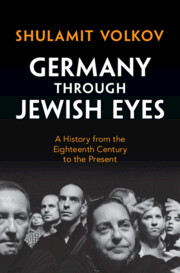Refine search
Actions for selected content:
62 results
3 - A Biography of Law
- from Part II - In the Court of Law
-
- Book:
- Moral Autopsy
- Published online:
- 18 November 2025
- Print publication:
- 30 October 2025, pp 135-161
-
- Chapter
- Export citation
12 - Coda: Thinking in Practice – Arendt, Foucault, and the Challenge of Freedom
-
- Book:
- Tied Up in Tehran
- Published online:
- 28 September 2025
- Print publication:
- 16 October 2025, pp 317-330
-
- Chapter
- Export citation
8 - Women, Life, Freedom: One Movement out of Two Legacies
-
- Book:
- Tied Up in Tehran
- Published online:
- 28 September 2025
- Print publication:
- 16 October 2025, pp 185-227
-
- Chapter
- Export citation
3 - How Our Mothers Drive Us Crazy: Hospitality, Ritual, and the Burden of the Social
-
- Book:
- Tied Up in Tehran
- Published online:
- 28 September 2025
- Print publication:
- 16 October 2025, pp 39-56
-
- Chapter
- Export citation
1 - “Philosemitic Europe”
-
- Book:
- Good Jews
- Published online:
- 19 September 2025
- Print publication:
- 07 August 2025, pp 1-24
-
- Chapter
- Export citation
3 - Crimes against Humanity, Dehumanisation and Rehumanisation
-
- Book:
- Law and Inhumanity
- Published online:
- 20 June 2025
- Print publication:
- 17 July 2025, pp 45-66
-
- Chapter
- Export citation
13 - The Holocaust and Social Thought
- from Part III - Culture and Ideas
-
-
- Book:
- The Cambridge History of the Holocaust
- Published online:
- 16 May 2025
- Print publication:
- 12 June 2025, pp 309-331
-
- Chapter
- Export citation
3 - Human Action
-
- Book:
- Democracy for a Sustainable World
- Published online:
- 12 June 2025
- Print publication:
- 05 June 2025, pp 83-122
-
- Chapter
- Export citation
10 - Summary
- from Part IV - Aftermath, 1945–2024
-
- Book:
- Profits and Persecution
- Published online:
- 22 November 2024
- Print publication:
- 30 January 2025, pp 155-158
-
- Chapter
- Export citation
Chapter 5 - Traitors, Treason, and ‘Topsy-Turvy’ Values in Kazuo Ishiguro’s ‘The Summer After the War’ and An Artist of the Floating World
-
- Book:
- Twentieth-Century Literature and the Aftermath of War
- Published online:
- 20 December 2024
- Print publication:
- 09 January 2025, pp 181-211
-
- Chapter
- Export citation
3 - “Safe Third Country”
- from Part I - Territoriality and Rights Protection
-
-
- Book:
- Lawless Zones, Rightless Subjects
- Published online:
- 02 January 2025
- Print publication:
- 09 January 2025, pp 59-74
-
- Chapter
-
- You have access
- Open access
- HTML
- Export citation
9 - Hopes Shattered
- from Part III - Living in Germany: 1870–1930
-
- Book:
- Germany through Jewish Eyes
- Published online:
- 14 November 2024
- Print publication:
- 21 November 2024, pp 147-162
-
- Chapter
- Export citation

Germany through Jewish Eyes
- A History from the Eighteenth Century to the Present
-
- Published online:
- 14 November 2024
- Print publication:
- 21 November 2024
Introduction
-
- Book:
- Democracy, Theatre and Performance
- Published online:
- 17 May 2024
- Print publication:
- 27 June 2024, pp 1-18
-
- Chapter
-
- You have access
- HTML
- Export citation
2 - Political Action and Valuable Institutions
- from Part I - Political Community
-
- Book:
- Statehood as Political Community
- Published online:
- 15 February 2024
- Print publication:
- 22 February 2024, pp 48-69
-
- Chapter
- Export citation
Chapter 8 - The Socratic Gadfly (Haematopota oxyglotta socratis)
-
- Book:
- The Trojan Horse and Other Stories
- Published online:
- 09 November 2023
- Print publication:
- 11 January 2024, pp 187-208
-
- Chapter
- Export citation
21 - Germans in Amerika: Written Possibility, Uninhabitable Reality
- from Part III - Postwar Essays and Essayism (1945–2000)
-
-
- Book:
- The Cambridge History of the American Essay
- Published online:
- 28 March 2024
- Print publication:
- 14 December 2023, pp 361-377
-
- Chapter
- Export citation
3 - Shared Habits: Love, Time, and The Magic Mountain in 1925
- from I - Literature and Poetry
-
-
- Book:
- Heidegger and Literary Studies
- Published online:
- 09 November 2023
- Print publication:
- 23 November 2023, pp 51-77
-
- Chapter
- Export citation
Chapter 4 - Forced Labor
-
- Book:
- The Jewish Imperial Imagination
- Published online:
- 08 November 2023
- Print publication:
- 09 November 2023, pp 101-129
-
- Chapter
- Export citation
‘The nation has conquered the state’: Arendtian insights on the internal contradictions of the nation-state
-
- Journal:
- Review of International Studies / Volume 50 / Issue 4 / July 2024
- Published online by Cambridge University Press:
- 22 August 2023, pp. 682-699
- Print publication:
- July 2024
-
- Article
-
- You have access
- Open access
- HTML
- Export citation
